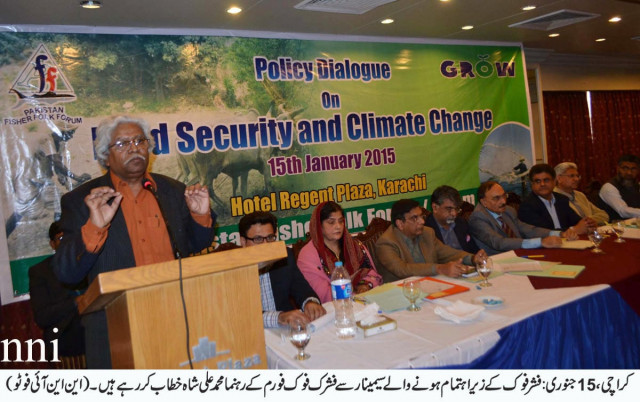Climate change: ‘Bad climate deprives coastal areas of spring season’
Speakers at seminar on food security urge govt to plan how to tackle the issue

Speakers urged the government to plan how to tackle the issue of food security. PHOTO: NNI
These concerns were shared by Pakistan Fisherfolk Forum (PFF) chairperson Mohammad Ali Shah as he was speaking at a policy dialogue on ‘Food Security and Climate Change’ at Regent Plaza hotel on Thursday. The environmentalists and civil society activists urged the government to initiate a strategy to tackle the issue of food insecurity.
“The situation is very critical in the coastal areas,” agreed Senator Karim Ahmed Khawaja. “Sea intrusion is increasing and we have to tackle this issue as soon as possible,” he added. He quoted one of his friends from Thatta telling him that Badin and Thatta districts will be under water by the year 2050.
There were hundreds of islands in Sindh and Balochistan during the British era, the senator pointed out, adding that they don’t exist now. “I have taken up this issue in meetings in Islamabad.”
Tahir Qureshi, a coastal ecosystem expert of the International Union for Conservation of Nature, mentioned that 50 per cent of the population in the region faces food insecurity. “These same people face a number of diseases as well,” he added. Qureshi said that old areas located near the Karachi coast have been ignored when it comes to basic facilities.
Talking about global problems, PFF’s Shah said nearly one billion people in the world face food insecurity. “Population is increasing rapidly but that is not the actual issue because two billion tons of food is wasted every year,” he said. “We lack proper planning.”
Shah, who was very critical of government policies, said that a majority of people who are already deprived of basic necessities are not being included during policy making.
Overfishing had led to a situation where there will be no fish in any ocean across the globe, he claimed, urging the government to take extra measures. He also said that the unsustainable agriculture practices have also created a number of problems.
“The Sindh government doesn’t take serious measures to initiate any policy in any field,” claimed Zulfiqar Halepoto, a civil society activist. “It lacks political will and there will be no progress without policies.”
Shah Jahan Baloch, the Sindh region manager for ActionAid, said that his organisation has contacted provincial governments to formulate food security policies. “Pakistan is an agricultural country and we witness bumper crops every other year, yet we face food dearth,” he said.
“Food insecurity is a serious issue in Pakistan,” agreed technical engineer of the Pakistan Agriculture Research Council, Kamran Bux. “The recent example is of deaths in Tharparkar region.” He also discouraged overfishing saying that the entire population of the world will solely depend on fish when there is no food left.
Sindh Assembly lawmaker Sorath Thebo, Syed Nasir Hussain Shah, PPF’s Fatima Majeed, Jameel Junejo and others also spoke about climate change issues in the region, particularly along the coastal belt.
Published in The Express Tribune, January 16th, 2015.


















COMMENTS
Comments are moderated and generally will be posted if they are on-topic and not abusive.
For more information, please see our Comments FAQ